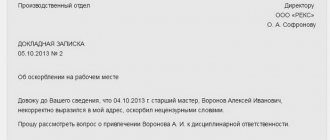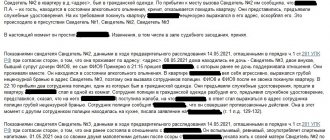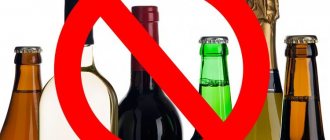After the corresponding law was adopted, the number of offenses committed by drunk people decreased, and the rates of child alcoholism decreased, since the law also limits the sale of alcoholic beverages within walking distance of schools, gymnasiums and lyceums.
The very concept of “public place” is not regulated by the article, but it is generally accepted that all objects where there is always a large crowd of people are considered such - it could be a park, a store, a stadium or a concert venue of any level. Many social activists insist on revising the legislation and creating a clear list of places where drinking is strictly prohibited. For now, Article 171 of the Federal Law is tied to other laws.
What is drinking in public?
Knowledge of what a public place is will help responsible citizens eliminate the risk of committing an offense. It is generally accepted that this
- a place that is not someone's personal property,
- parks, streets, bus stops and even stairwells, flights, elevators,
- educational, medical, sports, government facilities,
- trains, planes, minibuses, buses, trams, trolleybuses.
That is, you can drink alcohol where such actions will not interfere with other people.
Law prohibiting drinking alcohol in public places
Aspects of alcohol circulation - production, sale, consumption - are regulated by Article 171 of the Code. It is constantly being edited, changed and updated with new standards. According to the latest revision, alcoholic beverages prohibited in public places are considered
- simple and sparkling wines
- all types of beer, any cocktails,
- liqueurs and cognacs,
- drinks with a strength of 40% and above,
- artisanal alcohol
- products not intended for drinking.
In simple terms, you should not drink anything that causes intoxication in a public place.
Penalties
The rules of behavior accepted in society do not allow drinking alcohol and alcohol-containing products that cause intoxication in public places. That is why these acts are classified as offenses and are punishable in accordance with the Code of Administrative Offenses, which contains three articles establishing liability for drinking alcoholic beverages.
Article 20.20 establishes punishment specifically for drinking alcoholic beverages and alcohol-containing liquids. This article consists of several parts, which establish different levels of responsibility: from a fine to deportation from the country (for foreigners) or administrative arrest.
Article 20.21 will punish for being in a public place under the influence of alcohol or drugs. Responsibility is expressed in the form of a fine or administrative arrest.
Article 20.22 of the Code of Administrative Offenses establishes penalties for drinking alcoholic beverages in public places by minors under the age of 16, as well as for drinking alcohol.
The article for drinking alcohol by minors entails administrative liability for the parents of the minor. It can be expressed in the form of a fine in the amount of 1,500 to 2,000 rubles.
The minor himself (over the age of 16) may also be punished, and it will overtake him under any of the three specified articles, depending on what was committed.
In addition to administrative responsibility, the teenager will be subject to registration with the police, which will subsequently create a number of problems and restrictions. The person will also be subject to forced registration at a drug treatment clinic.
The teenager’s parents will be required to receive notification at their place of work, and the teenager who has committed a violation will receive notification at their place of study.
For the sale of alcohol-containing products to a teenager, the seller who violated the rules for the sale of alcoholic products will bear the same responsibility as the minor. If parents or other adults teach a child to drink alcohol, they will also be held responsible for their unlawful actions. For more information about fines for selling alcohol to minors, read this article https://lexconsult.online/7520-realizatsiya-alkogolnyh-napitkov-nesovershennoletnim
Drinking alcohol in the presence of children
This offense carries one of the most serious administrative penalties. Persons who allow themselves to drink alcohol in the presence of their child or where there are other people's children risk receiving a significant fine.
The law does not provide for punishment for consuming alcoholic beverages with children in one’s apartment, but only if the actions of adults are not dangerous for the child. By drinking within reasonable limits, without involving minors in the process, without being rowdy or causing discomfort to neighbors or others, a person is not breaking the law.
But if in a family a mother and/or father abuse alcohol in the presence of children, do it constantly and neglect the upbringing and care of children, their actions can serve as a reason not only for a fine, but also for deprivation of the right to be called parents.
Can parents drink alcohol in front of their children? Here's what the experts say
First, let's be clear: parental alcoholism is a large and complex problem that has an extremely negative impact on the lives of parents themselves and their children. In this article, when we talk about alcohol consumption, we mean periodic, situational consumption of alcoholic beverages, such as a glass of wine after a hard day or on holidays.
It is important to note that children see and notice much more than we imagine. So if you periodically drink in the presence of children, rest assured that they are aware, not only of the frequency of your alcoholic libations, but also of your relationship with alcohol and even the special vocabulary that you use in the process.
So, for example, if you see alcohol as a way to distract yourself and relax, and throughout the day you remember how you can’t wait to be on the couch with a glass of white, and then you finally pour it, sit down and say “Well, finally,” the children are all they notice this, remember it, and they develop an image of alcohol as some kind of life-saving remedy that helps from all problems.
“We know from several studies that as early as age three, children are aware of the circumstances in which or where adults drink alcohol—whether it's on holidays or in arguments that lead to violence,” says Foundation for Alcohol Research and Education director Michael Thorn. . “Children understand what happens when their parents drink.”
Family has an important influence on the kind of relationship a child will have with alcohol in the future. Children who see their parents drunk are more likely to have a negative attitude towards alcohol, but in the future this often leads to the fact that they themselves drink irresponsibly.
But in reality, how a child will drink alcohol when he grows up (or whether he will drink it at all) depends on many other factors: genetics, environment, peer relationships, government policies and the public image of alcohol.
The best things parents can do for their children to help them develop a healthy relationship with alcohol: don't make alcohol seem too attractive (as a cure for all worries and a way to quickly relax), be honest about possible risks and dangers (but also don't be too intimidating) and be prepared to answer any questions directly and honestly.
Family consultant Mayra Mendez notes that there is no need to completely hide from children the fact that parents sometimes drink alcohol - it is much more important to demonstrate a responsible approach to drinking. “Children can see it as appropriate and moderate drinking at dinner or at a family gathering,” she explains. “It’s important to introduce children to alcohol because it helps them learn social norms and cultural expectations about its use.”
Clinical psychologist Robin Goodmin also drew the attention of parents to the fact that they should first develop a line of behavior regarding alcohol issues. “Parents must first decide on their attitude towards alcohol,” she explains. — Drinking in the presence of children is not illegal. There are simply things that adults can do, but children and teenagers can’t.”
As in most other educational issues, here a lot depends on the personal example of the parents and their ability to set boundaries - strict prohibitions work much worse. You can drink at home in front of your children, but do it responsibly.
Don’t idealize alcohol, but don’t demonize it either (even if you don’t drink it yourself) - answer questions honestly and use only trusted sources of information.
Talk about the dangers of alcohol, introduce safety rules (for example, do not drive even after one drink) and follow them yourself. Keep in touch with your children during their teenage years so you know what they are doing and what their friends are doing.
Drinking alcohol is not a crime, but another aspect of adult life that can be fit into the life of any family so that it brings pleasure, rather than problems and worries. However, if you decide to give up alcohol completely, that’s also great, the main thing is to remember that your child just has to make his choice regarding alcohol, and for this it is better for him to be informed.
Read more on the topic
How to get back into wine (and alcohol in general) after a break: 6 simple tips
Where did jokes about moms and vino come from?
How to survive a hangover if you have children
Drinking alcoholic beverages by minors
Teenagers are prohibited by law from purchasing and drinking alcohol. But punishment for the crime, regardless of whether it happens at home or outside, is provided only for the parents of a minor drinker. Among young people, those who have already crossed the age threshold of 16 years are subject to punishment.
The fine varies from 1,500 to 2,000 rubles, and depends on the severity of the offense - what condition the teenager was in, whether he violated public order and how seriously, whether the police had to detain him.
Who will pay the fine - the parents or the lawbreaker himself - depends on his age. Persons over 16 years of age must pay the amount established by the administrative court independently in the generally accepted manner.
Teenagers and drinking alcohol: consequences and responsibility
In addition to the already mentioned Art. 6.10 of the Code of Administrative Offenses of the Russian Federation, if teenagers under 16 years of age are found to be intoxicated, or it is established that they are drinking alcoholic beverages, a fine in the amount of 1,500 to 2,000 rubles may be imposed on parents (Article 20.22 of the Code of Administrative Offenses of the Russian Federation).
To bring parents to justice under Article 20.22 of the Code of Administrative Offenses of the Russian Federation, it is not necessary that the teenager be detained in a public place. The mere fact of identifying a state of intoxication or drinking alcohol is enough.
Minors aged 16 to 18 years are liable on a general basis under Art. Art. for appearing in public places while intoxicated and for drinking alcohol on the streets. 20.20 and 20.21 Code of Administrative Offenses of the Russian Federation.
Also, in Russia there is a practice of attracting parents of teenagers under the “universal” Article 5.35 of the Code of Administrative Offenses of the Russian Federation - “Failure of parents or other legal representatives of minors to fulfill responsibilities for the maintenance and upbringing of minors.”
Prosecution for drinking alcohol
Monitoring order is the responsibility of the PPS police department. They have the right to draw up a protocol on the offense if they have recorded the fact
- drinking alcohol in public areas,
- inappropriate behavior, incoherent speech,
- aggressive reaction to comments made.
As a rule, the protocol is not drawn up immediately. The police make a remark and ask you to stop drinking alcohol. If in response to this they begin to be rude or aggressive, they draw up a report and can detain the offender for up to 15 days.
Based on the protocol drawn up by the police officers, an administrative case is initiated, which is considered in court after all its circumstances have been clarified.
What is the administrative fine for drinking alcoholic beverages?
Many citizens treat fines with disdain, which is wrong for oneself. Negative consequences for the fact of being brought to administrative responsibility may be in your future life.
A citizen who is under police supervision and subject to administrative punishment may also be punished criminally. The presence of several violations of this type - from 2 or more - can also lead to a real term.
Those who involved in involving teenagers in drinking alcohol also receive a real prison sentence. Persons who drink within the walls of preschool educational institutions, and even when there are pupils there, that is, young children, are severely punished.
Can minors drink alcohol at home?
It's no secret that many parents allow their 16-17 year old children to drink a little champagne or wine under their supervision in honor of their birthday or New Year.
However, even in this case, it should be borne in mind that parental permission to drink 50 grams of champagne or take a sip of beer on a holiday can be regarded as involving a minor in drinking alcohol and entail liability under Article 6.10 of the Code of Administrative Offenses of the Russian Federation, which provides for punishment in the form of a fine. . In Russia, the practice of involving parents under this article exists and is not uncommon.
Involving teenagers in systematic alcohol consumption may result in criminal prosecution under Article 151 of the Criminal Code of the Russian Federation
How to pay a fine for drinking alcoholic beverages
Any fine must be paid within 2 months (60 days) after the decision comes into force. Russian law states that a decision is considered valid 10 days after the trial. That is, the violator, in fact, has 70 days after the trial to find funds to pay the fine and deposit them into the state account.
This can be done at the cash desks of any bank, at special payment terminals or at ATMs. You can also make payments through online banking in your personal account. The main thing is to provide the court with evidence that the fine has been paid. This could be a check or a statement from the offender's personal bank account.
How to check whether a fine has been paid or not
Innovative technologies make it possible to check the payment of fines without leaving home - on the government services portal or another service. Lawyers recommend doing this without fail so that punishment for evading punishment does not follow.
You can check whether the fine has been paid or not by name, resolution number and other data on the portals of the following departments:
- public services,
- Bailiffs Service,
- tax service,
- Migration Service (for citizens of other states).
The listed online resources allow you to view information not only about fines for drinking alcohol, but also others. You can visit these departments in person and request the necessary information on the performance of administrative duties.
Liability for failure to pay a fine
Among the violators of public order who are fined, there are many so-called evaders. It is important to understand that the law provides for punishment for this crime:
- imposition of another penalty (fine),
- doubling the fine - the amount must be 1,000 rubles or more,
- arrest for a period of at least 15 days and forced payment of a fine,
- community service – from 50 hours or more.
If the execution of the court decision is neglected again, the punishment will be increased. The term of arrest increases to 50 days, the fine can be increased several times, and the period of community service can be up to 1-2 months.
Statute of limitations for administrative fines
Both in criminal cases and in administrative cases, including for drinking alcohol in public places, there is a statute of limitations. The concept implies a certain period, after which the offender no longer has the right to be punished. For administrative cases, it is 2 years. The idea that you can avoid paying a fine for two years and it will be automatically written off is erroneous and can lead to a more serious punishment.
The limitation period is applied in rare cases that comply with the legislation in force in the state. It is possible to avoid punishment (fine) only if the court decision on an administrative offense is unfair, complaints and relevant statements were received from a person recognized as a violator, and he tried to challenge the adopted decision.
Drinking alcohol in the presence of minors
Question:
After work on Friday, I was taken to the police station for drinking beer at home in front of my minor children. They threatened that they would take away the children for the reason that I do not have the right to drink beer in front of minors. Note that I drank beer at home and in front of my sleeping children. There was no family quarrel, I was just sitting at the computer and drinking beer, the alcohol content of which was 4.6%.
Tell me, please, do the police have the right to come and drag me out of the house?
Lawyer's response:
In Art. 20.20 of the Administrative Code there is a ban on drinking alcohol in public places with a list of these places. There are no apartments on this list.
Most likely, in your case, someone showed excessive vigilance and contacted the police or guardianship and trusteeship authorities to check how the child’s rights are respected. The actions of the police officers in this case are not entirely legal, so you can contact the prosecutor's office with a complaint, because from the description it looks like an abuse of official authority.
Ask your question to a lawyer!
Some other answered questions from the “Administrative Offences” section:
The legality of bringing to responsibility under Part 2 of Art. 12.2 Code of Administrative Offenses of the Russian Federation?
I bought a car. I registered the car. I didn’t hang up the numbers near the traffic police department because there was no fastener. I decided to drive to my house and put them there...
Drinking alcohol in the presence of minors
After work on Friday, I was taken to the police station for drinking beer at home in front of my minor children...
Overtaking under a “no overtaking” sign. Deprivation of rights.
They are trying to deprive me of my license for overtaking on an intermittent lane, but there was a “no overtaking” sign there, which I did not see...
There was no registration number because there was no bumper.
The traffic police took my driver's license because the registration number on the front was missing. It was there, but it was lying on a panel in the cabin, since there was no front bumper...
Violation of traffic rules due to potholes on the road
I was driving along the highway and, in order to avoid a large hole, one side of the car crossed a double solid marking line. After that, the traffic police inspector stopped me...
Using someone else's driver's license
My husband's brother is his twin, he showed impudence and used his husband's license, since he himself was deprived of his driver's license for driving while drunk...
Other Q&A topics:
- Debts
- Credit
- Loan guarantee
- Mortgage
- Collectors
- Insurance
- Purchase and sale of real estate
- Buying and selling cars
- Divorce
- "Civil marriage
- Establishing paternity
- Alimony
- Inheritance, wills
- Exchange of living space
- Housing issue
- Privatization
- Agreements and powers of attorney
- Donation
- Administrative offenses
|
Where is drinking alcohol allowed?
On the territory of every municipality, be it a city or a village, there are places where it is officially permitted to drink alcohol - these are bars, cafes, restaurants. You will not be punished for visiting them and drinking alcoholic beverages on their territory.
You can have fun at the table with alcohol at home or in your yard, but you can’t disturb your neighbors by making noise or being rowdy. Involving young children or teenagers under 16 years of age in the process is also criminally punishable.
If you follow these legal and moral rules, then there will be no fines or other negative consequences for a party with alcoholic beverages. It is important to understand that the law is created for the benefit of each citizen of the Russian Federation.
Is it possible to avoid liability for drinking alcohol in a public place?
Due to the fact that the article on administrative liability for this offense does not contain a clear list of public places, decisions on it may be challenged. For example, a protocol was drawn up for drinking alcohol on the playground at night, when there are no children or anyone else there. This fact can become a significant argument in favor of the offender, because at the time of the administrative crime there were no people around.
It is also possible to appeal a decision to impose a fine if the container of alcohol was hidden in a paper bag, and the offender did not have visual, pronounced signs of intoxication.
The procedure for filing a petition to appeal a court decision involves filing a corresponding application with higher judicial authorities within 10 days after the trial, while the requirement to pay a fine has not yet entered into legal force. The complaint must be recorded by an official of the organization in the presence of the complainant.
Parental responsibility for children's alcohol use
In recent years, the state has paid special attention to the fight against alcoholism, however, the issue of alcoholization of society, and especially the younger generation, does not lose its relevance, because the number of offenses committed related to the use of alcoholic beverages remains significant.
Against the backdrop of the state's ongoing fight against the alcoholization of society, facts of condoning the use of alcoholic beverages by minors on the part of persons entrusted with the responsibilities of raising and educating minors stand out. Thus, facts often come to light when parents sometimes become the initiators of their children’s drinking. In many “prosperous” families, it is sometimes not considered criminal to give a child dry wine or beer, and sometimes to treat him with vodka. “Let him start drinking at home,” says another father, pouring a drink for his teenage son. And the children themselves, imitating adults, often pour themselves a glass while at a common table. Such imitation of adults can end in failure. And responsibility for what is happening should be placed on all those who are directly or indirectly involved in the formation of harmful habits among young people. The state has created many tools to combat alcoholism, one of which is a measure of influence in the form of administrative liability for offenses related to the use of alcoholic beverages. Federal Law No. 171-FZ of November 22, 1995 “On state regulation of the production and turnover of ethyl alcohol, alcoholic and alcohol-containing products” on the territory of Russia established a ban on the consumption (drinking) of alcoholic products by persons under 18 years of age in any doses, where and with no matter who they are, and the Code of Administrative Offenses of the Russian Federation (hereinafter referred to as the Code of Administrative Offenses of the Russian Federation) defines liability for violating this prohibition. Federal Law No. 365-FZ of December 21, 2013 introduced amendments to the Code of Administrative Offenses of the Russian Federation, according to which the amount of the administrative fine for involving a minor in the use of alcohol and alcohol-containing products, as well as for being in a state of intoxication of minors, consuming (drinking) alcoholic products in prohibited places or consumption of narcotic drugs or psychotropic substances in public places. Article 6.10. The Code of Administrative Offenses of the Russian Federation stipulates that involving a minor in drinking beer and drinks made on its basis, involving a minor in drinking alcoholic beverages or intoxicating substances, entails the imposition of an administrative fine in the amount of one thousand five hundred to three thousand rubles. If parents or other legal representatives of minors, as well as persons entrusted with the responsibility for teaching and raising minors, are involved in alcohol consumption, they will be punished by an administrative fine in the amount of four thousand to five thousand rubles. In 2014, in the territory of the ZATO Ozerny, two persons, including one parent, were brought to administrative responsibility for involving a minor in drinking alcoholic beverages. For being in a state of intoxication by minors under the age of sixteen, or their consumption (drinking) of alcoholic and alcohol-containing products, or their consumption of narcotic drugs or psychotropic substances without a doctor’s prescription, or other intoxicating substances, parents or other legal representatives of minors are held administratively liable. Punishment for this offense in the form of an administrative fine in the amount of one thousand five hundred to two thousand rubles is provided for in Article 20.22. Code of Administrative Offenses of the Russian Federation. In 2014, in the ZATO Ozerny, for minors under the age of sixteen years being in a state of intoxication, police officers identified and drew up four administrative offense reports; in all cases, parents were held administratively liable. There are five cases of bringing minors themselves, aged 16 to 18 years, to administrative responsibility for being intoxicated in a public place that offends human dignity and public morality. I would also like to remind you that the sale of alcoholic products to a minor, if this action does not contain a criminal offense, according to Article 14.16. Part 2.1. The Code of Administrative Offenses of the Russian Federation will entail the imposition of an administrative fine on citizens in the amount of thirty thousand to fifty thousand rubles; for officials - from one hundred thousand to two hundred thousand rubles; for legal entities - from three hundred thousand to five hundred thousand rubles. On the territory of the ZATO Ozerny in January 2015, one citizen was brought to administrative responsibility for selling alcoholic products to a minor (by the decision of the Magistrate's Court of the judicial district of the ZATO Ozerny he was subjected to administrative punishment in the form of a fine of 30 thousand rubles). Children's attitude towards life, their attitude towards drunkenness largely depends on how their parents themselves treat them. Children, as a rule, try to imitate their parents in everything. The latter should remember this and not set bad examples for children. We must try to develop in children their own negative attitude towards drinking alcohol. The child must not only know firmly that alcohol is harmful and its use is dangerous. He must still have certain moral and volitional qualities that allow him to defend his convictions in a company where he will be persuaded to drink, sometimes by his older friends or peers, who are highly respected by him. Senior Inspector of the PDN of the Ministry of Internal Affairs of Russia for the ZATO Ozerny and Solnechny, Tver Region, Police Major E.S. Konar.









